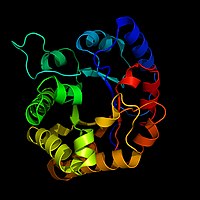
Back Ensiem Afrikaans Enzym ALS Enzima AN إنزيم Arabic انزيم ARZ উৎসেচক Assamese Enzima AST Fermentlər Azerbaijani آنزیم AZB Ферменттар Bashkir

An enzyme is a protein molecule in cells which works as a biological catalyst.[1] Enzymes speed up chemical reactions in the body, but do not get used up in the process, so they can be used over and over again.
Almost all biochemical reactions in living things need enzymes. With an enzyme, chemical reactions go much faster than they would without the enzymes.[2]p39 Other biocatalysts are catalytic RNA molecules, called ribozymes.
The substances at the start of a reaction are called substrates. The substances at the end of a reaction are the products. Enzymes work on the substrates and turn them into products. The study of enzymes is called enzymology.
The first enzyme was found in 1833 by Anselme Payen.
- ↑ Concise Oxford Dictionary.
- ↑ Kornberg, Arthur (1989). For the love of enzymes: the odyssey of a biochemist. Harvard University Press. ISBN 0-674-30775-5.